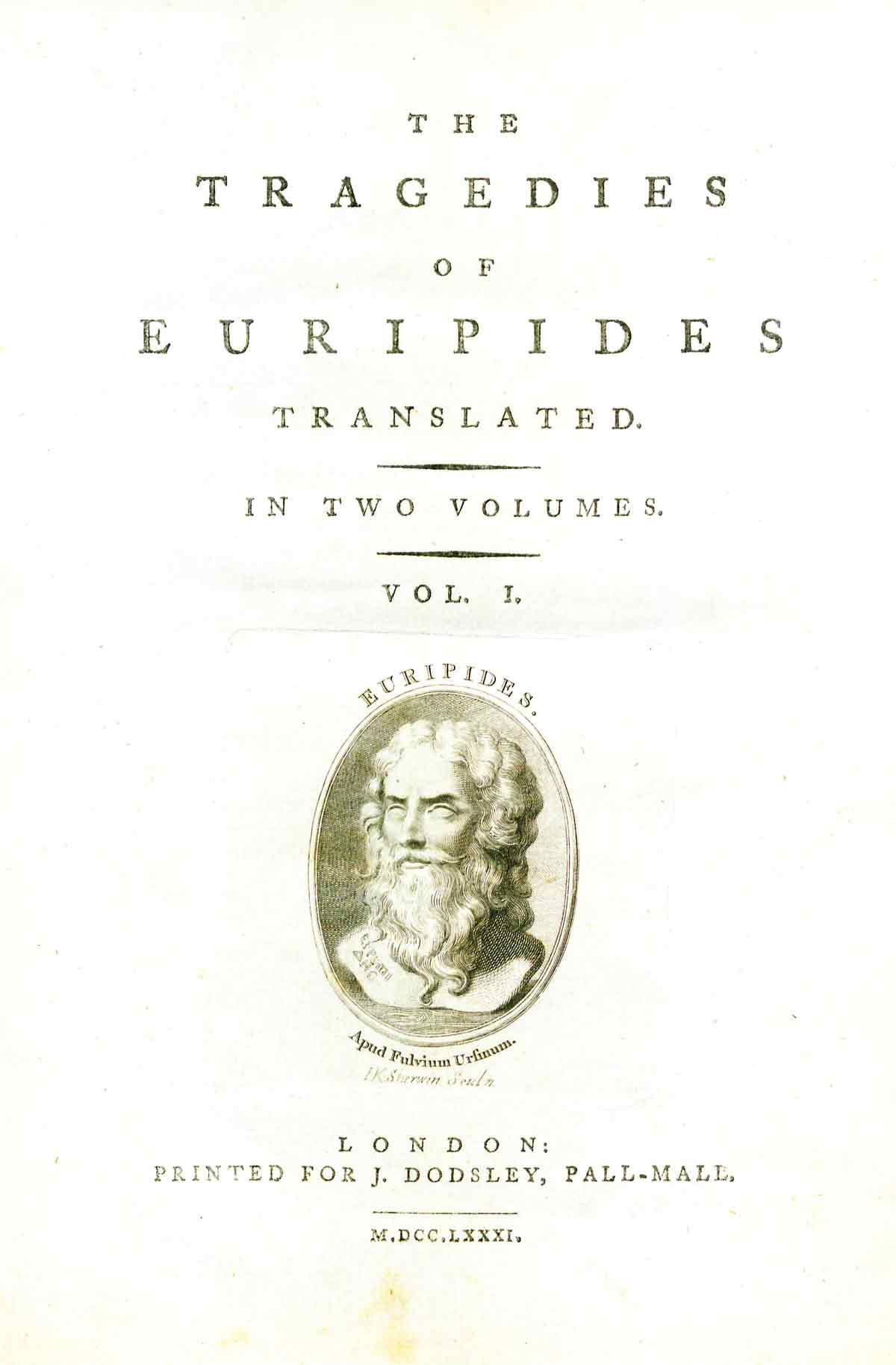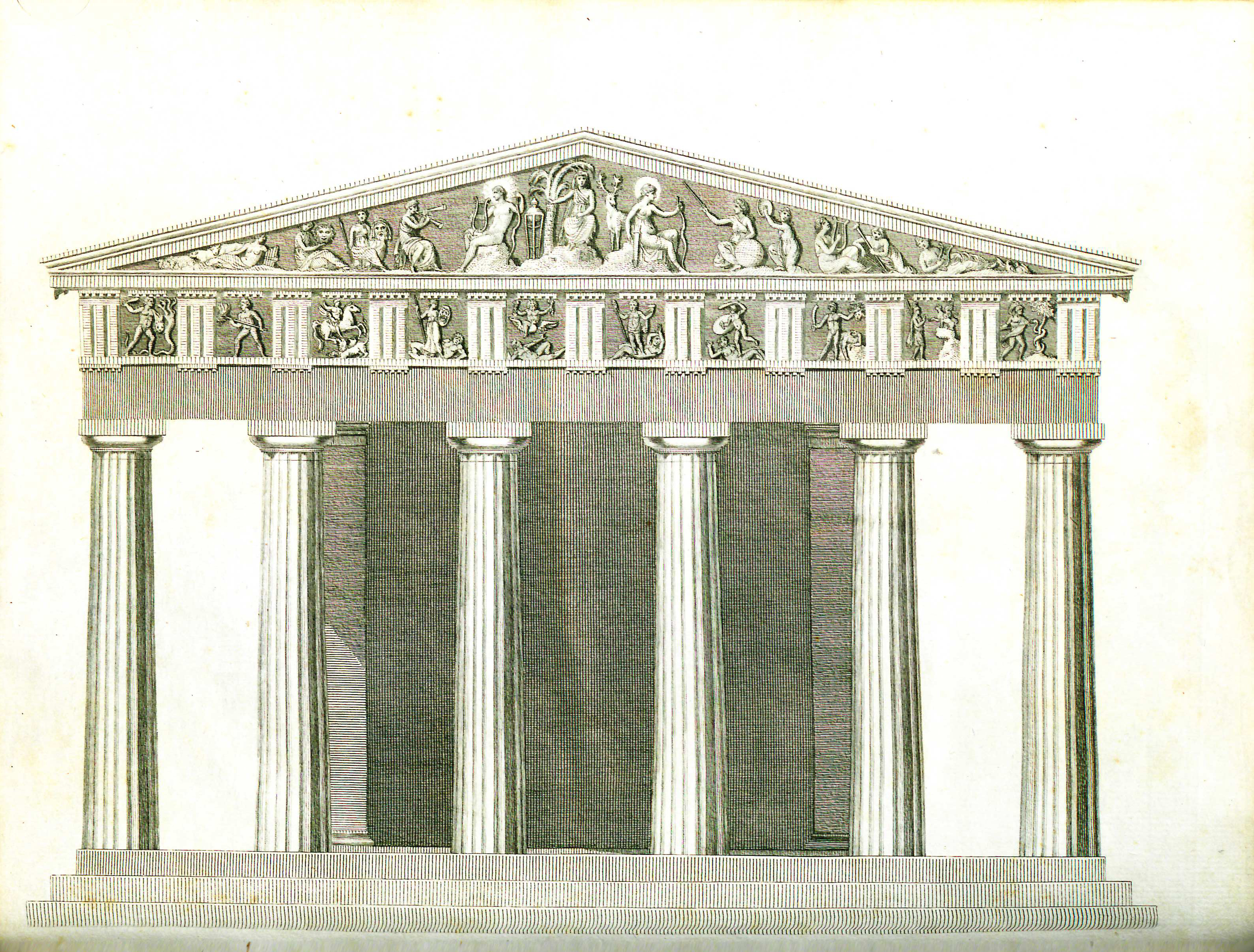Difference between revisions of "Tragedies of Euripides"
| Line 27: | Line 27: | ||
Bound in contemporary speckled calf with flat spines with red morocco lettering pieces. Purchased from Blackwell Rare Books. | Bound in contemporary speckled calf with flat spines with red morocco lettering pieces. Purchased from Blackwell Rare Books. | ||
| − | View this book in [https://catalog.swem.wm.edu/Record/3473590 William & Mary's online catalog]. | + | View the record for this book in [https://catalog.swem.wm.edu/Record/3473590 William & Mary's online catalog]. |
==References== | ==References== | ||
Revision as of 17:44, 17 March 2015
by Euripides
| The Tragedies of Euripides | |
|
Title page from The Tragedies of Euripides, volume one, George Wythe Collection, Wolf Law Library, College of William & Mary. | |
| Author | Euripides |
| Translator | Robert Potter |
| Published | London: Printed for J. Dodsley, Pall-Mall |
| Date | 1781-1783 |
| Language | English |
| Volumes | 2 volume set |
| Desc. | 4to (29 cm.) |
Euripides allegedly wrote 92 plays, 80 for which titles are known, and 19 of which are extant.[5] Extreme emotions and unorthodox events are prevalent in Euripides’ writing, often shown through the use of the Chorus. His characters battle societal pressures, torturous situations, and inner conflicts, highlighting "his awareness that personality is inherently a fragmented thing, different aspects being displayed at different times."[6] Toward the end of his life, Euripides' plays became less tragic, and the importance of the Chorus and the prevalence of songs decreased.[7]
This collection of Euripides’ tragic plays is in two volumes containing all of his eighteen extant tragedies. The first volume includes The Bacchae, Ion, Alcestis, Medea, The Phoenician Virgins, Hippolytus, The Suppliants, Hercules, and The Heraclidae. The second includes Iphigenia in Aulis, Rhesus, The Trojan Dames (The Trojan Women), Hecuba, Helena, Electra, Orestes, Iphigenia in Tauris, and Andromache. The only extant work excluded is Cyclops, a satyr play.
Evidence for Inclusion in Wythe's Library
Listed in the Jefferson Inventory of Wythe's Library as "Potter's Euripides. 2.v. 4to." This was one of the sets kept by Thomas Jefferson. He later sold a copy of "Euripides, Eng. by Potter" to the Library of Congress in 1815, but it no longer exists to verify Wythe's prior ownership.[8] Both the Brown Bibliography[9] and George Wythe's Library[10] on LibraryThing include the London 1781-1783 edition based on E. Millicent Sowerby's inclusion of that edition in Catalogue of the Library of Thomas Jefferson. The Wolf Law Library purchased a copy of the same edition.
Description of the Wolf Law Library's copy
Bound in contemporary speckled calf with flat spines with red morocco lettering pieces. Purchased from Blackwell Rare Books.
View the record for this book in William & Mary's online catalog.
References
- ↑ "Euri'pidēs" in The Oxford Companion to Classical Literature, ed. by M.C. Howatson (Oxford: Oxford University Press, 2011).
- ↑ Ibid.
- ↑ "Euripidēs" in Oxford Dictionary of the Classical World, ed. by John Roberts (Oxford: Oxford University Press, 2007).
- ↑ Ibid.
- ↑ "Euri'pidēs” in The Oxford Companion to Classical Literature.
- ↑ Ibid.
- ↑ "Euripidēs" in Oxford Dictionary of the Classical World.
- ↑ E. Millicent Sowerby, Catalogue of the Library of Thomas Jefferson 2nd ed. (Charlottesville: University Press of Virginia, 1983), 4:532 (no.4530).
- ↑ Bennie Brown, "The Library of George Wythe of Williamsburg and Richmond," (unpublished manuscript, May, 2012) Microsoft Word file. Earlier edition available at: https://digitalarchive.wm.edu/handle/10288/13433
- ↑ LibraryThing, s. v. "Member: George Wythe", accessed February 27, 2014.
External Links
Read volume two of this book at Hathi Books.

